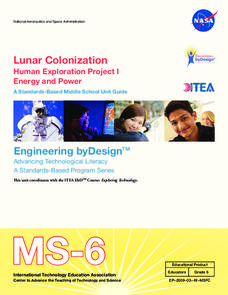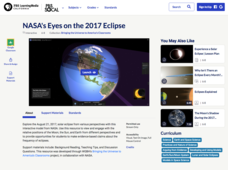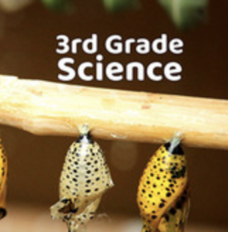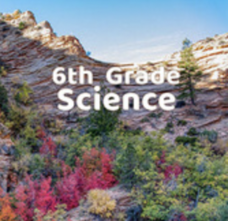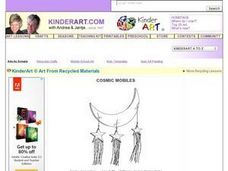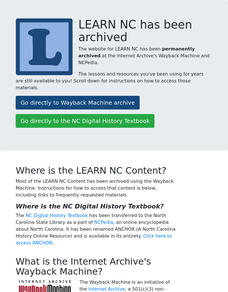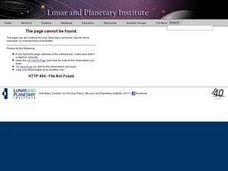University of Colorado
Enceladus, I Barely Knew You
Use spectral knowledge to make discoveries on a distant moon. Small groups gather information from images of one of Saturn's moons. The moon orbits within the E-ring made up of mainly water ice. Using information about the composition of...
Vosonos
Interactive Minds: Solar System
Travel through space as you learn about the galaxy, solar system, planets, and much more. An extensive resource for studying astronomy in upper-elementary and middle school classrooms.
NASA
Lunar Colonization
A five-lesson unit challenges teams to design a complex to allow people to colonize the Moon. The teams first work in order to understand the challenge before becoming experts. Expert teams learn about different aspects needed to survive...
NASA
Creating a Space Exploration Infrastructure
What will it take to explore space? Teams of pupils determine the needs of a lunar outpost and research the required systems. The pupils then learn about the past space exploration vehicles. The third and final lesson challenges project...
NASA
Watering Your Plants
Make sure plants have water to drink regularly. Learners investigate the parts of a watering system for plants. They design and create a watering system for a lunar plant growth chamber before explaining why it is important to have water...
NASA
Evaluating a Lunar Eclipse
Do all lunar eclipses look the same? Find out in an activity where astronomers use the Danjon Scale of Lunar Eclipse Brightness to describe the color and brightness of the moon during an eclipse. Explorers make three observations using...
Keep it Simple Science
The Earth in Space
Skim the surface of the earth with this brief, compact, summary of outer space. The sun, stars, galaxies, planets, and phases of the moon can be found in this all-in-one resource. Seventh graders will enjoy these simple worksheets to do...
NASA
Lunar Plant Growth Chamber
Would astronauts be able to grow their food on the Moon? Teams research plant growth in order to design and build a growth chamber that will function on the lunar surface. They narrow down plant choices based upon their strengths and...
Itsy Bitsy Fun
Halloween Color By Numbers
Bring some Halloween math to the class for a spooktacular addition to your instruction. Here, scholars color by number to uncover four spooky scenes including a pumpkin, a bat flying across the moon, haunted trees, and a cat.
Laboratory for Atmospheric and Space Physics
Explore Saturn and Titan with Spectral Data
Titan is Saturn's largest moon and has its own atmosphere. An attention-grabbing tutorial allows learners to analyze the spectrum of Saturn and Titan to determine their elemental compositions. Scholars compare a known element's spectrum...
CK-12 Foundation
Venn Diagrams: Planets and Dwarf Planets of the Solar System
Yes, Venn diagrams are helpful in science, too. Learners use an interactive to classify celestial bodies as having moons, as dwarf plants, as both, or as neither. They answer a set of challenge questions based on the Venn diagrams they...
PBS
NASA's Eyes on the 2017 Eclipse
How did the 2017 eclipse look in Los Angeles—or Chicago? Experience both views, plus many more, using a lesson from PBS's Space series for middle schoolers. Scholars follow the movements of the sun, moon, and Earth during the most recent...
Utah Education Network (UEN)
Utah Open Textbook: 3rd Grade Science
How do we interact with Earth? Scholars learn about the sun, Earth, moon, forces, gravity, and heat sources by reading a text and performing hands-on demonstrations. They also differentiate between living and non-living things using...
Utah Education Network (UEN)
Utah Open Textbook: 6th Grade Science
There are many interactions among living things and their surroundings. By completing a reading, scholars learn about the Earth, the moon, and the sun and how they relate to the solar system. They also investigate the basics of physical...
American Museum of Natural History
What Do You Know About Astronomy
Develop an understanding of the universe. Learners answer 10 multiple choice questions about several topics in astronomy. Questions contain information about the age of the universe, gravitational attraction, galaxies, planets and comets...
NASA
The Saturn System Through the Eyes of Cassini
Get a close-up view of Saturn. Pupils read a NASA eBook filled with images of the Saturn system, including the rings and moons of Saturn along with images of the planet itself. Learners become familiar with the planet's system as they...
NASA
Touchdown
Just how do astronauts stay safe during moon landings? Here's an activity that allows investigators to use the engineering process to explore how shock absorbers protect astronauts during landing. Applying knowledge of gravity, force,...
Curated OER
Cosmic Mobiles: Recycled Art
If you have a little left over tinsel and aluminum foil, your class can create these fun moon and star mobiles. Poster board or recycled cardboard become your moon and stars; the tinsel gives them sparkle. This would be a great activity...
Curated OER
Counting Sentences' Words
Explore language arts by completing a worksheet with class. They read the story Owl Moon and discuss the rhythm of the writing and how action verbs are used appropriately. Then complete a writing worksheet which discusses writing...
Curated OER
Planets And Moons Web Quest
Students work with a partner using the Internet to find the answers to a web quest about space exploration. They work in cooperative groups to discuss information and evaluate its importance to space exploration.
Curated OER
The Moon
Third graders identify the phases of the moon. They use the internet to see the different phases of the moon on different dates. They form their own opinions from the information they have read and justify their opinions to their...
Curated OER
Spreadsheet Moon Comparison
Pupils use the Internet to research characteristics of moons for other planets They use a spreadsheet to organize information for all of the moons researched. They use the spreadsheet data to make statements showing comparisons and...
Curated OER
Space Science: A Scoop of Moon Dirt
Students discover soil characteristics and how it is formed on Earth and the Moon by examining local samples to a lunar simulant. They replicate the effects of wind erosion by scraping dry bread with sandpaper. Students use rocks and...
Curated OER
Lunar Real Estate
Learners investigate the aspect of colonizing the moon by comparing techniques that are used on Earth. The colonization takes place with the planning of a hypothetical model. The model is used as a point of discussion and target...
Other popular searches
- The Moon and Tides
- The Moon Landing
- Comparing the Moon and Sun
- Man on the Moon Video
- The Moon Phases
- The Moon Is Down
- Science the Moon Orbit
- The Moon Tides
- The Sun Earth Moon System
- Phases of the Moon Journal
- Moon and the Earth
- How the Earth and Moon Compare




